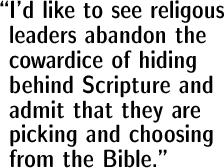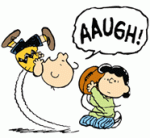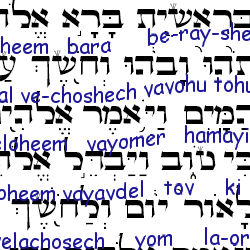Archive
“The Bible Says So” and Other Stupid Arguments
“The Bible Says So”
Between the on-going debate about gay marriage and the recently-noted anniversary of the hugely divisive Roe v. Rade decision legalizing abortion, more people have been shouting: “The Bible says so. That’s how I know!”
Even though I respect the Bible, and even though it forms the foundation of my personal and professional life, I think the argument is stupid.
 Here’s why: Everyone filters the Bible through their own personal preferences, choosing the parts they like.
Here’s why: Everyone filters the Bible through their own personal preferences, choosing the parts they like.
Two examples will help demonstrate what I mean.
The first comes from the many people who use Leviticus 18:22 — about a “man who lies with man as with a woman” — to defend anti-homosexual positions. (For some reason, this stance seems particularly popular among mega-church leaders, who really ought to know better: Rick Warren, for example, or Joel Osteen, who recently told CNN that the Bible says that homosexuality is a sin.)
The second comes from the many people who use “thou shalt not kill” from the Ten Commandments to defend anti-abortion or anti-death-penalty positions.
Homosexuality
It’s true that Leviticus 18:22 seems to discourage homosexuality, and though it stops short of specifically calling it a sin (which is why I think Pastor Osteen is wrong — more here), I’m not convinced by those who try to interpret the text as being about anything other than homosexuality.
But the very same section of the Bible also prohibits making clothes by combining different materials (Leviticus 19:19), technically known as sha’atnez.
 So unless Pastor Warren, Pastor Osteen, and those of their ilk are willing to take a public and vehement position against wool-and-cotton clothing, I have no patience for their argument that they are locked into their anti-homosexual position by the Bible. They are not. They are choosing the verses they like, and, apparently, they like to hate homosexuality.
So unless Pastor Warren, Pastor Osteen, and those of their ilk are willing to take a public and vehement position against wool-and-cotton clothing, I have no patience for their argument that they are locked into their anti-homosexual position by the Bible. They are not. They are choosing the verses they like, and, apparently, they like to hate homosexuality.
Similarly, Leviticus 20:13 condemns homosexuals to death, but the same punishment is mandated for people who curse their parents (Leviticus 20:9). Are those in the “it says so in the Bible” camp willing to pass laws that put children to death for speaking out against their parents?
And for that matter, Leviticus 20:10 demands the death penalty for both the man and woman involved in an adulterous relationship. Is that a law that the anti-homosexuality crowd advocates?
I believe in religious freedom, and if religious leaders want to speak out against homosexuals, I suppose it’s their right. But they are not locked into that position by the Bible. It’s their personal religious choice.
(Similarly themed passages in the New Testament, like Romans 1:26-27, are more complicated, but the same basic principal applies. Romans 1:26-27, for example, takes a negative view of both male and female homosexuality — though not actually calling either a “sin” — but in a much longer passage, starting at Romans 14:1, the same book demands tolerance and acceptance, even of sinners: “Welcome those who are weak of faith,” “[Do not] pass judgment on one another,” etc.)
Thou Shalt Not Kill
Perhaps even more than homosexuality, abortion is one of the most vexing issues of our day. Although people disagree about the details, almost everyone shares the opinion that at some point a fetus deserves the protection afforded to a human — the question just seems to be when. And the death penalty is just as divisive, with the sides remaining even further apart.
But the Ten Commandments don’t help in either case.
First of all, the original commandment doesn’t refer to “killing” but only to “illegal killing,” as in “murder” and “manslaughter.” The message in the Ten Commandments is that killing is a matter of morality. (I have more here.) So the Ten Commandments highlight the importance of getting abortion and death-penalty laws right, but they don’t provide any particular guidance regarding the details.
More to the point, though, the Ten Commandments also prohibit taking God’s name in vain, but we don’t hear religious leaders suggesting laws against that.
So again, I think religious leaders have the right to decide which of the Ten Commandments they think are important, but I also think they have an obligation to be honest with their followers. The leaders are not simply conveying Scripture. They are interpreting it as they see fit.
Hiding Behind Scripture
So when Pastor Osteen says that, “the Scripture shows that [homosexuality] is a sin,” he is being deceptive. What he means is, “my interpretation is that homosexuality is a sin.” When Pastor Warren spends his money to oppose homosexuality (and not, say, to advertise Romans 14:13: “so let us no longer pass judgment on one another”), he is not a neutral interpreter of Scripture. He is, rather, exercising his right as a religious leader to speak about what he personally feels is important.
More generally, I’d like to see religious leaders abandon the cowardice of hiding behind Scripture and admit that they are picking and choosing from the Bible, opting only for what’s important to them.
We’re All Charlie Brown During the Holidays
 Who can forget the repeated scenes of Charlie Brown falling flat on his back yet again after trying to kick a football that Lucy has impishly yanked away? No matter how many times he’s failed, good old Charlie always believes that this time will be different. Lucy has changed. And he’ll finally succeed.
Who can forget the repeated scenes of Charlie Brown falling flat on his back yet again after trying to kick a football that Lucy has impishly yanked away? No matter how many times he’s failed, good old Charlie always believes that this time will be different. Lucy has changed. And he’ll finally succeed.
It’s funny because we all know that Charlie Brown will miss the ball.
But really, I think, it’s funny because we see ourselves in the character of Charlie Brown.
Each year at the holidays, we are accosted by images of happy children reveling in their newly received gifts.

 The most wished for toy on Amazon.com — I’ve managed to live a pretty happy life never having even heard of it until today — comes in a cartoonish package depicting three deliriously happy children smiling the way only cartoon characters can. And the top selling toy on that website similarly depicts a mother smiling with her two amazingly happy pre-teen and teenage children.
The most wished for toy on Amazon.com — I’ve managed to live a pretty happy life never having even heard of it until today — comes in a cartoonish package depicting three deliriously happy children smiling the way only cartoon characters can. And the top selling toy on that website similarly depicts a mother smiling with her two amazingly happy pre-teen and teenage children.
“Shop by age to find the perfect toy,” Amazon.com advertises, following up with five pictures of smiling children.
What a concept: “The prefect toy.” Good grief!
It’s as though the only thing standing between children and unlimited bliss is the right gift. Find the right toy, and even teenagers will be gleeful. Siblings will stop fighting and start getting along. You’ll get home from work in time to enjoy the evening with your children, who suddenly will have no homework. Even your house will magically become spotlessly clean. All if you find the right gift.
Children and adults alike buy into the myth, with real dollars.
But it doesn’t work. Like Charlie Brown, we find our goal of a Gift To End All Sadness snatched away at the last minute.
And, worse, we come to a reasonable but wrong conclusion when it doesn’t work: we think that we have simply bought the wrong gift. So we set out — again like Charlie Brown — with the firm but wrong expectation that next time will be different. The next gift will make our lives better, and fix what’s wrong in the lives of those we love.
I have nothing against gifts. I like giving them and I like getting them. I will keep buying things for the important people in my life, and nothing I write here should dissuade you, dear friends, from buying things for me.
So, yes, I like presents.
Even more, I like the messages of the holidays.
And lest I once again fall flat on my back, I try not to confuse one with the other.
On Experience and Politics
“I’m not a trained pilot. But I’m sick and tired of turbulence when I fly. Is it okay if I fly the plane text time?”
This is what I think of when I hear candidates proclaim that their lack of political experience will make them better politicians.
Governing isn’t easy. There’s skill involved. And, as with many things, experience probably helps.
So what do you think? Is lack of experience a good thing in a political candidate?
If your school were a country, which one would it be?
Different countries work differently, both in theory and in practice. I think we can learn from these differences.
Just for example, the Russian approach to hostage situations assigns top priority to killing the hostage takers. This is why, in October of 2002, Russian forces pumped poison gas into a Russian theater that Chechen rebels had taken over. Even though the theater contained hundreds of innocent civilians, including some very prominent Russians, the decision was made — in keeping with Russian policy — to do everything to kill the offenders.
By contrast, the U.S. approach would have assigned higher priority to getting the civilians out alive.
Similarly, the center traffic lanes in Moscow were reserved for high-ranking political officials, while in the U.S., everyone has to yield to emergency vehicles: the well-being of American citizens is (supposed to be) more important than the luxury of the ruling class.
More generally, the United States is — at least in theory and, I think, largely in practice — devoted to democracy, openness, transparency, and human rights. (I know there are exceptions.) Other values seem to include self-sufficiency, individuality, and the right to become rich. And having an independent and critical media seems pretty important.
China, by contrast, places more emphasis on societal rights than on individual ones. Toward this end, China exerts more control than the U.S. does over what its population has access to. This is one reason that the Chinese government censors the Internet.
Iran goes even further, censoring almost everything in its attempt to control the population. Creativity is discouraged and conformity is rewarded.
For that matter, I know people from corruption-ridden countries who lament the bureaucracy in the U.S. “At least back home,” goes one complaint, “you can bribe someone if you’re in a hurry. Here you have no recourse.”
Most people I know laud the U.S. approach and criticize China and Iran for their lack of openness.
Yet I frequently encounter Hebrew Schools that contain elements of what seem to be Chinese or Iranian principles: The Internet is censored or otherwise restricted. Cell phones are banned. (I understand the cell-phone issue is more complicated.) The collective good in the form of quiet and order trumps individual students’ needs.
In many schools, classroom environments are designed for the comfort of the teacher instead of the well-being of the students, just as the Soviet Union offered convenience to politburo members at the expense of ordinary citizens.
Most schools discourage independent, critical observation, and have nothing that plays the role of the media.
So here’s my question: if your school were a country, which country would it be? And are you happy with the answer?
Two Thoughts on Global Warming
Two thoughts on global warming:

 1. Wind Energy. Wind turbines, which convert wind into energy, are hailed as a way of generating energy without harming the environment.
1. Wind Energy. Wind turbines, which convert wind into energy, are hailed as a way of generating energy without harming the environment.
But I think we need that wind. I’m afraid we’re going to discover in ten or twenty or fifty years that the wind was part of the global ecosystem.
After putting a massive wind farm in, say, one of the plain states, will we have rain systems that no longer make their way across the country and instead stay put, causing massive flooding in the middle of the country and drought in the east?
2. Energy and Heat. Two of the biggest challenges facing us seem to be (a) not enough energy, and (b) the warming of the planet.
But heat is energy.
Can’t we solve both of these problems at the same time by using the extra heat on the planet for energy?
And God Said Goes On Sale Today
|
More information about the book is available here. I’ve also set up a blog for the book, and you can even find it on Facebook. (“Won’t you be my friend?” the book wants to know.) It took me four months and fifteen years to write. I hope you enjoy it. |
“A wise and important book.” -Rabbi Harold Kushner “Hoffman’s work is the best gift for a careful reader of [the Bible].” -Dr. Walter Brueggemann “Retrieves what the Bible really was.” -The Very Reverend Dr. James A. Kowalski |
For $12.17 you can have the best school in the country.
TD Bank is the best bank in the country. Here’s why, including how I think we can use the information to build better religious schools.
About a year ago, while I was in the process of refinancing my home, I had a small line of credit from TD Bank; it, too, was secured against my home. I only needed the line of credit for a month or two until the paperwork was completed on the refinance, and I only used about $3,000 of the line.
After the first month I got a bill for $12.17 in interest, which I promptly paid online from my Citibank checking account. Unfortunately, Citibank didn’t process the transfer (I still don’t know why), but also didn’t tell me until the day I was about to leave the country, which was also the day the payment was due.
Knowing I would be paying off the loan in a month or two anyway, I had already (foolishly) thrown away the mortgage statement, so I didn’t know who to call about the loan. I didn’t even know my mortgage number. I started to panic. I had visions of a destroyed credit rating, foreclosure proceedings, and who knows what. Certainly I would be unable to refinance the house with a loan in default.
The only phone number I had was the TD Bank branch where I signed the papers.
So I called them. Could they accept payment by credit card? No. Could they take a check over the phone? No, not from Citibank. How about an electronic transfer of some sort? No, only between accounts at TD Bank. I explained the whole story and pleaded for help.
The woman at the other end of the phone gave me a solution. She would pay the $12.17 from her own account. Then, when I returned from traveling, I could stop by the branch and pay her back. Now, I didn’t have a TD Bank account. I was going to be paying off their loan. I lived 30 minutes away by car. And the women had never met me. But she gave me $12.17.
And the result is that I’m writing a blog entry about how good TD Bank is, and, when I can, I’m going to move my accounts there.
Here’s my question: how does your religious school measure up to TD Bank?
After all, wouldn’t it be truly awful if a bank gave an anonymous customer better service than schools give parents, teachers, and children in what is supposed to be a holy community?
More specifically:
1. Do you require dues to be paid in full before children can attend school, or do you let children attend and hope that parents will want to pay for a job well done? What about bar/bat mitzvah?
2. When parents say that their schedule doesn’t permit them to bring their child to a particular class/event/service, do you try to accommodate them or do you chastise them for not caring enough about Judaism?
3. When children say they don’t feel well, are you more likely to believe them or to assume that they’re trying to trick you?
4. Is it the school’s policy to pay teachers as much as possible, or to get away with paying them as little as possible?
5. Is your school an example of the best possible customer service?
Some planets need Hebrew names, and you can help – Haaretz – Israel News
By way of Haaretz:
For more than 1,000 years, when Hebrew speakers looked at the sky, they saw five planets — Hama (Mercury), Noga (Venus), Maadim (Mars), Tsedek (Jupiter) and Shabtai (Saturn). The five planets closest to earth all have ancient Hebrew names, some of them dating back to the time of the Talmud.
On the other hand, the two planets that are further away — Uranus and Neptune — were not known in ancient times, and are therefore referred to by these names in Hebrew, too. Now the Hebrew Language Academy is inviting the public to help choose Hebrew names for the solar system’s farthest flung planets.
Darfur and the Silent Voices of Suffering
Rabbi Billy Dreskin will fast for the 24 hours leading up to Rosh Hashanah, as part of the Fast for Darfur program. For Rabbi Dreskin, whose son, Jonah, died tragically just a few months ago, the plight of the population in Darfur is both remote and personal:
I will always cry for Jonah, that is for certain. But what seems like a lifetime ago, I used to also cry for the people of Darfur. Now, six months after I bid farewell to my own child, I am once again able to think of children elsewhere, of other families that are suffering horrendous grief. For this reason, beginning at sundown this evening, I will participate in a 24-hour Fast for Darfur. This seems like the proper moment for me to do this. Rosh Hashanah represents new beginnings. In some small but meaningful way, speaking out for this beleaguered, helpless people — who still await the world’s stopping the crimes of humanity being perpetrated against them — is my way of beginning to live again. I doubt it will stop my tears for Jonah, but maybe it will help move forward a process that will keep other parents from shedding tears for their own child.
I’m reminded of the line in Unetaneh Tokef that references the Biblical kol d’mamah daka, variously “still, small voice” or “small voice of silence.” “Let the great shofar be sounded, and let the small voice of silence be heard,” the prayer reads.
This Rosh Hashanah, as I hear the sound of the shofar, I will listen for the voices of silent suffering around the world. And during the coming year — taking my cue from Unetaneh Tokef — I will do my best to make sure those voices are heard and never ignored.

 I’m thrilled to announce that my latest book,
I’m thrilled to announce that my latest book, 


